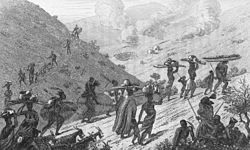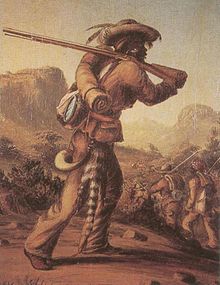- Fengu people
-
Fengu/Fingo 
Regions with significant populations  South Africa
South AfricaCape Province 1 million Languages Xhosa
(many also speak Zulu, Ndebele, or other indigenous languages such as Sotho)Religion Related ethnic groups The Fengu (plural amaFengu) are a Bantu people; originally closely related to the Zulu people. They were previously known in English as the "Fingo" people, and they gave their name to the district of Fingoland (Mfenguland), the South West portion of the Transkei division, in the Cape Province. Originally the Transkei included the territories of Idutywa Reserve, Fingoland (Mfenguland) and Galekaland (Gcalekaland). Following their annexation they were restructured into the divisions of Butterworth, Tsomo and Nqamakwe for Fingoland; Kentani and Willowvale for Galekaland; and Idutywa for the Idutywa Reserve.
Contents
History
The name amaFengu means "wanderers" and the Fingo nation - like the Bhaca, Bhele, Hlubi and Zizi peoples - was formed from the tribes that were broken up and dispersed by Shaka and his Zulu armies in the Mfecane wars. Most of them fled westwards and settled amongst the Xhosa. After some years of oppression by the Gcaleka Xhosa (who called the Fengu their "dogs"), they formed an alliance with the Cape government in 1835 and were invited by Sir Benjamin d'Urban to settle on the banks of the Great Fish River in the region that later became known as the Ciskei. They subsequently became notable allies of the Cape Colony in the frontier wars against their former oppressors. In this capacity, they won several victories against their Xhosa enemies (particularly the Gcaleka Xhosa), and through shrewd and successful management of regional trade, formed a developed and materially successful nation. In addition, many bought farms and started businesses in the small towns that were springing up in that part of the Cape frontier.
 The amaFengu, known across southern Africa as skilled gunmen, were invaluable allies of the Cape in its frontier wars.
The amaFengu, known across southern Africa as skilled gunmen, were invaluable allies of the Cape in its frontier wars.
The Mfengu did not take part in the great cattle-killing in 1857, which devastated the Xhosa people. While the Xhosa slaughtered their own cattle and burnt their crops, many Mfengu instead bought the Xhosa cattle at very low prices, only to resell them at a profit during the subsequent famine. They also were recorded as producing large excesses of grain at this time for the starving Xhosa. The famine induced by the cattle-killing effectively brought the armed resistance in the eastern Cape to an end. In 1866 British Kaffraria was annexed to the Cape Colony. Barring a brief revolt in 1877 and 1878, when the amaGcaleka turned upon their amaFengu neighbours, the British annexation of lands east of the Kei River proceeded fitfully, but generally unimpeded. In September 1879 this was followed by Idutywa Reserve and Mfenguland, and Gcalekaland in 1885. It is assumed that the restructuring of these territories into the divisions of Butterworth, Idutywa, Kentani, Nqamakwe, Tsomo and Willowvale dates from these times. The last major war that the Mfengu fought was the Ninth Frontier War that broke out in 1877 after a fight between Fengu and Gcaleka guests at a Fengu wedding. After initial defeats of the Fengu and their Cape Colony allies, the Fengu rallied and eventually inflicted a defeat on their Gcaleka and Ngqika enemies, killing their King, Sandile, in a shoot out in 1878. The ingratitude of the British governor Sir Henry Bartle Frere, who promptly humiliated the Cape's Fengu allies by forcibly disarming them, caused the Fengu to begin to identify more with the Xhosa, partly as a reaction to increasing persecution from the Colonial authorities.
Originally farmers, the Mfengu had quickly built themselves schools, created and edited their own newspapers, and translated international literature into their language. The reason that the Mfengu were able to adapt so effectively to changing circumstances (like the coming of capitalism and urbanisation) was because they lacked a fixed tribal social-structure and hierarchy (having presumably lost it in their earlier flight from the Zulu). This state of social change and flexibility allowed them to quickly adjust to the European expansion, learn and adapt new techniques, and take advantage of the upheavals that followed. Other tribes were often suspicious of outside ideas and consequently resisted any change to meet the colonial threat. Many Fingo have also subsequently intermarried with other ethnic groups, particularly with the Xhosa and Zulu. [1]
Present day South Africa
Today virtually all the Fingo people have intermarried with other ethnic groups particularly with the Xhosa and Zulu. Many are now often considered - especially by outsiders - to be ethnically Xhosa and others Zulu, because of their common language and some similar customs. A considerable number have a mixed racial background, especially in and around the cape provinces.
See also
References
- ^ Illustrated History of South Africa. The Reader's Digest Association South Africa (Pty) Ltd, 1992. ISBN 0-947008-90-X. p.107, "The Arrival of the Mfengu in the Eastern Cape"
 This article incorporates text from a publication now in the public domain: Chisholm, Hugh, ed (1911). Encyclopædia Britannica (11th ed.). Cambridge University Press.Categories:
This article incorporates text from a publication now in the public domain: Chisholm, Hugh, ed (1911). Encyclopædia Britannica (11th ed.). Cambridge University Press.Categories:- Ethnic groups in South Africa
- South African people stubs
- African ethnic group stubs
Wikimedia Foundation. 2010.
